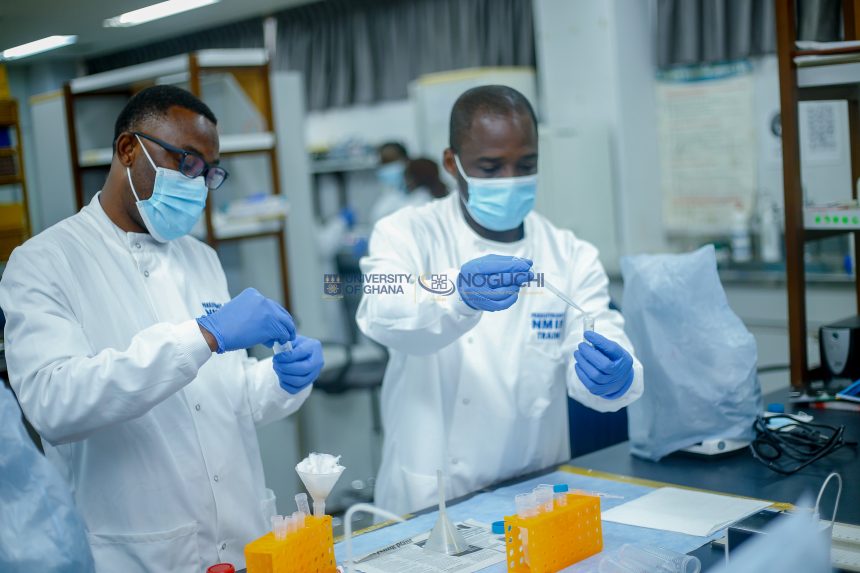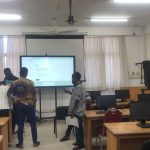The Noguchi Memorial Institute for Medical Research has held an opening ceremony for the 5th Annual Meeting of the Network for Buruli Ulcer and PCR (polymerase chain reaction) Laboratories to boost the diagnosis of Buruli ulcer in Ghana.
The fifth annual meeting, which is a three-day event ran from 23rd to 25th October at the Noguchi Memorial Conference Hall; it was organized by the Noguchi Memorial Institute for Medical Research (NMIMR), the World Health Organization (WHO), and the BU-LABNET Coordinating Centre at the Pasteur Centre of Cameroon to improve diagnosis of Buruli ulcer with PCR among member laboratories using standardized testing protocols, involving external quality assurance programmes.
Speaking at the ceremony, the Director of the NMIMR, Prof. Dorothy Yeboah-Manu, in her welcome address averred the passion of the institute in improving quality diagnosis and reiterated the Institute’s commitment to supporting global health care.
“For Noguchi, this is of importance to us because firstly, as a global health institution championing research including the sub region Ghana, we deem it as important as always adhering and supporting roadmaps. We are also very passionate in terms of improving quality diagnosis and so as an institution, we host several training workshop and we continually work to make sure that the global health agenda is achieved. I’m also excited because I remember when we started the Buruli ulcer agenda, we established a PCR diagnostic center at Noguchi and these years we’ve seen that the cases have really gone down. I would like to reiterate the commitment of the institute and how happy we are to host this very important meeting.”
The Dean of College of Health Sciences, Prof. Alfred Yawson, the Chairperson of the event called for sustained attention on Buruli ulcer and other tropical disease in Africa. To this, he noted Noguchi’s effort of strengthening laboratory capacity for early detection and treatment of Buruli in Ghana.
“It is important to not shift the attention entirely from Buruli ulcer and other neglected tropical skin conditions which are easily manageable if we detect them early. So early detection, diagnosis, treatment and management is key and we are all very much aware of the important role our laboratories play in these circumstances. In the recent COVID-19 pandemic, our institute (NMIMR) was pivotal in our nation’s ability to be able to fight the pandemic. It is in the same way that we are very happy for the patients who heal from the disease.”
Also speaking at the ceremony on behalf of the Director of Ministry of Health, Mr. Andrew Ofosu emphasized the critical need to reach and give health support to people in remote locations in the country. He further pledged the Ministry’s support to the Noguchi Memorial Institute in providing quality health care in Ghana.
“We should recognize that the critical first step that needs to be done is the urgent need to find a way of integrating the existing laboratory network infrastructure that are within countries to reach persons even in even the remotest of locations while maximizing efficiencies and ensuring that we also maintain the necessary laboratory quality assurance.
I would like to preach the immense goal that reference laboratories like Noguchi Memorial Institute has played in supporting our work as a service, not only on NTDs but on any other disease of public health importance and conducting research within our context. I would also like to also assure you of our continuous collaboration as a primary agent under the Ministry of Health for the implementation of such policy on health so that together, we can better coordinate preventions against NTDs in the country”.
The BU-LABNET which held the annual meeting was established in 2019 under the auspices of WHO is a network of 13 laboratories from nine endemic countries (Benin, Cameroon, Côte d’Ivoire, Democratic Republic of the Congo, Gabon, Ghana, Liberia, Nigeria, and Togo), including external experts with support from the WHO, American Leprosy Missions, the Anesvad Foundation (Spain) and the Raoul Follereau Foundation (France).
The Annual meeting which was a hybrid one brought together about 60 participants (network member laboratories, partners and skin disease experts) to take stock of progress since the last meeting in October 2022 and identify ways to implement the integrated control and management of skin diseases in line with the WHO Neglected Tropical Disease(NTD) road map 2021–2030 and the Skin NTD Framework and thus realize the vision of Skin Health for All.
The network also has a long-term goal of including other skin Neglected Tropical Diseases(NTDs) in the same molecular platform. These so-called skin NTDs1 all require similar detection and case management approaches that present opportunities for integration, which both increases cost–effectiveness and expands coverage.
Milestones achieved by the network includes successful harmonization of BU testing procedures for all member laboratories, implementation of two external quality assessment (EQA) rounds, and evaluation visits to 12 of these laboratories. With support from partners, BU PCR reagents and consumables have been donated to the laboratories for routine testing.
The major highlight of the fifth annual meeting will be to expand the activities of the network to include yaws, cutaneous leishmaniasis, mycetoma and leprosy and extend its scope to other laboratories.
–
Story by : John Collins Kaledzi | univers.ug.edu.gh




